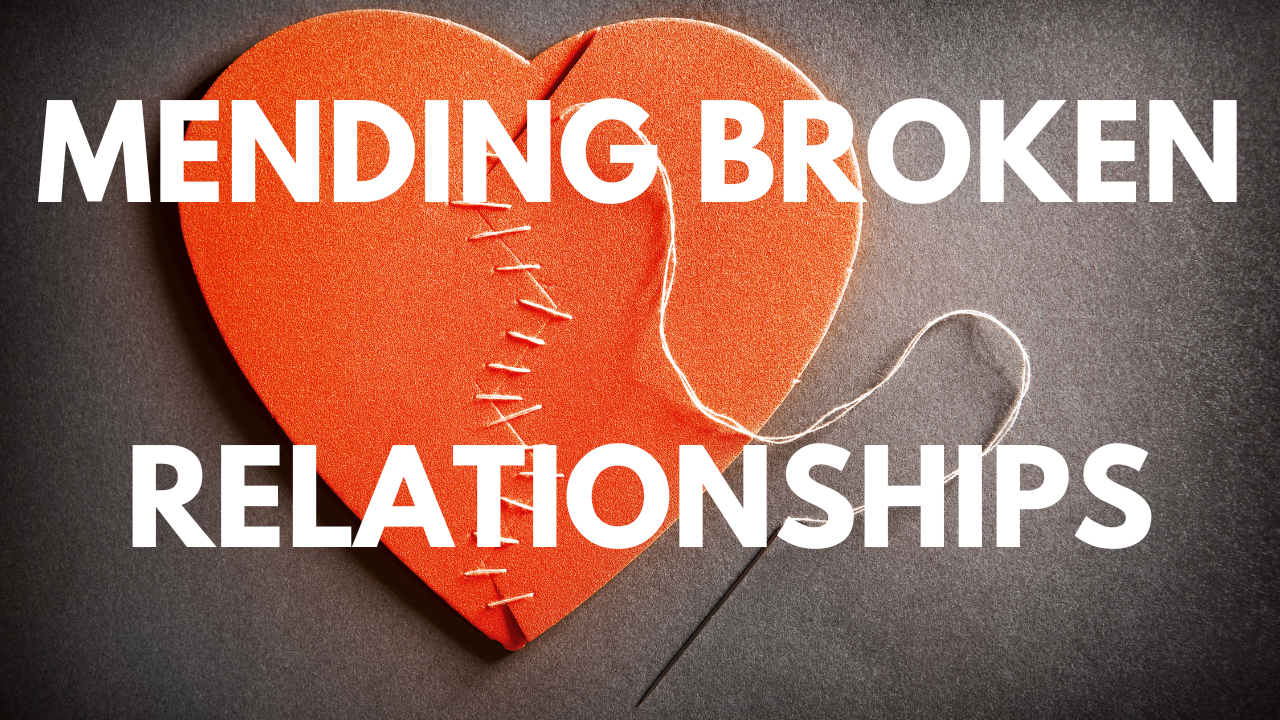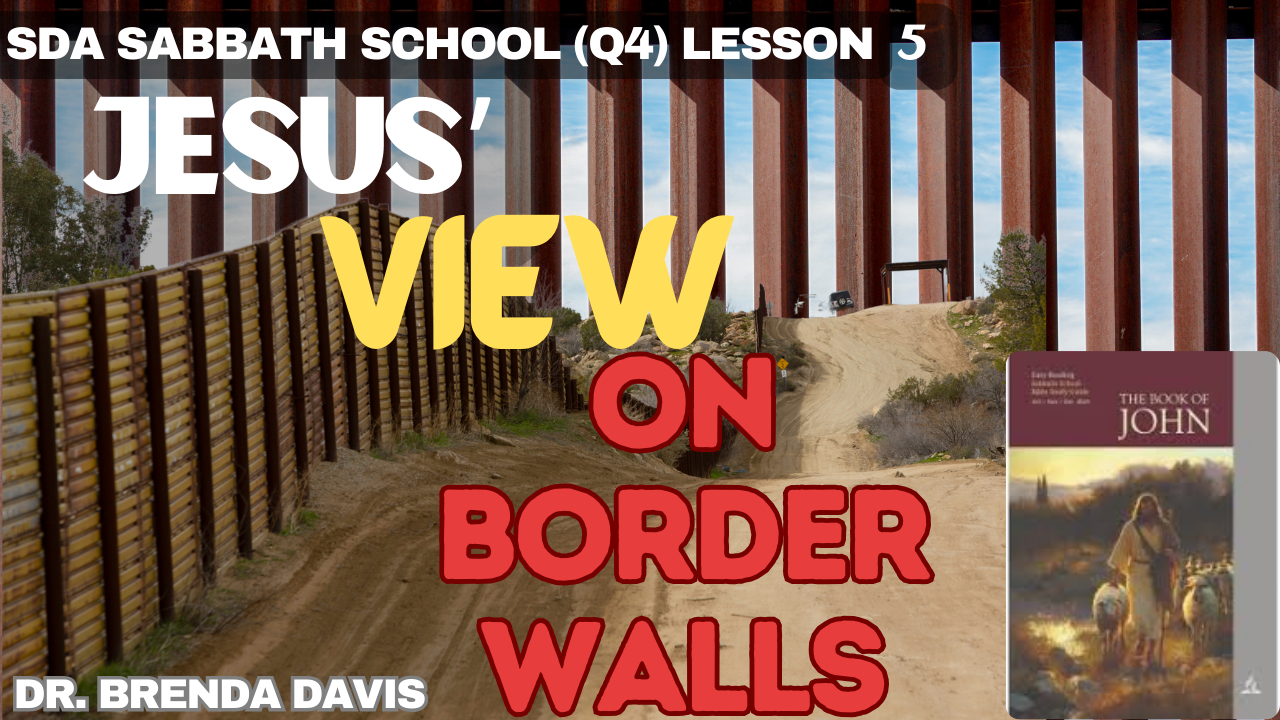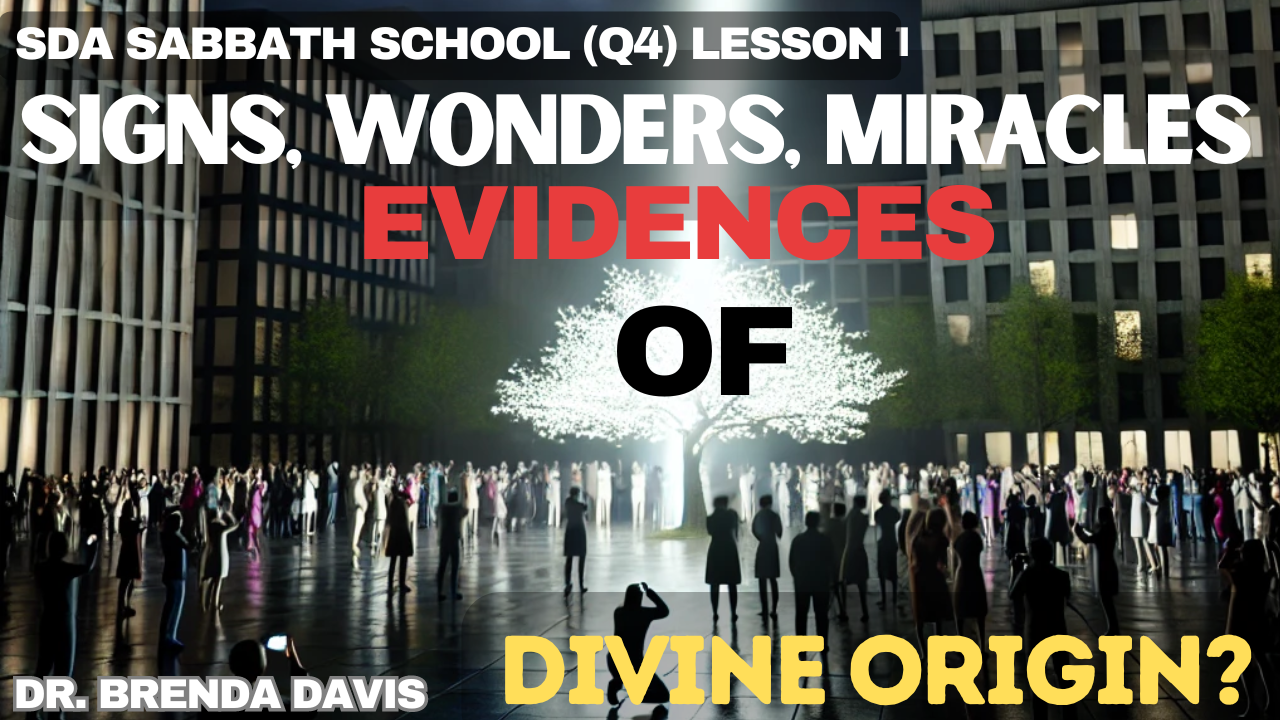Ephesians (Lesson 5) The Cross and the Church Part 1-3
MENDING BROKEN RELATIONSHIPS
Have you ever felt alienated or separated because of your culture, your race, how you looked, your beliefs, or because of disagreement? Do you feel that there is some invisible wall that has created a divide between you and others, even family members? How should we deal with these divides?
In this series, we are studying the Book of Ephesians. Paul wrote Ephesians as a letter to the churches in Ephesus. The Ephesians were Gentiles (Non-Jews) who had accepted Christ. He wrote the letter to encourage these converted Gentiles not to lose hope despite their opposition.
This week we look at Ephesians 2:11-22 which addresses the divide, the wall or petition that caused a separation between the Jews and the Gentiles. Here we address the role that Christ played in dismantling the wall that humans have built that has caused a separation between different groups of people.
You may view our past and present videos at SabbathSchoolDaily.com.
You can obtain the study guide for this series at Sabbath.School or ssnet.org, all of which are at no cost to you.
Let Us Invite God’s Presence:
Holy Father, thank you for Christ and the work He has done to bring about unity among your people. Help us to see that we are all one family in Christ Jesus. In Jesus’ Name, Amen.
The concern about the wall or divide between the Jews and the Gentiles must have been serious. Notice what Paul says about the divide that once existed between them in Ephesians 2:13-14
“But now in Christ Jesus, you who once were far off have been brought near by the blood of Christ. For he himself is our peace, who has made us both one” (Ephesians 2:13, 14)
How serious was it?
Picture this in your mind: you are a non-Jew, a Gentile living in Jerusalem during New Testament times. You are Greek. A short time ago, you learned about the God of the Jews. You accepted Him and stopped praying to the many false gods and have decided to worship the God who created Heaven and Earth. So, you decide to go to the Jewish Temple, where the true and Living God is worshipped. You walk across the beautiful court outside the Jerusalem temple. You walk praising God and imagine yourself worshipping Him inside His temple. As you make your way to the temple, you hear worship and praise going on. Then something gets your attention; you see a stone wall in front of the temple with big signs on it. The signs are written in Greek and Latin. The message on the signs is clear; it says: “No foreigner may enter. Any foreigner who tries to enter will be killed.” When you read these words, how do you feel? Let me guess. You feel separated, shut out, alienated from God.
But no need to despair.
Paul in Ephesians 2:11–22, offers words of encouragement. He tells you Jesus died on the cross to destroy the “walls” that separate people from God and from one another. The Cross brings us together. The cross eliminates alienation and separation. It brings together all humanity. It removes the separation between Jews and Gentiles or Jews and Non-Jews. Read what Paul says in Ephesians 211-22.
In Ephesians 2:15, Paul points out that the cross establishes peace between the Jews and Gentiles. Because of the cross, we become one family. Together when we accept Christ, we become part of the new temple. This temple is as expressed in Ephesians 2:22, “a dwelling place for God by the Spirit”.
Paul’s earlier description of these converts past may have been a good reason for the wall or partition, but a radical change has been made in the lives of these Gentiles Paul is addressing. What has made the difference?
Keep watching: View Part 2: Brought Near in Christ
Sabbath School Lesson Quarter (4) Ephesians
(Lesson 5)
The Cross and the Church
Part 2: Brought Near to Christ
In Ephesians 2:1–3, we see a description of a group of people, Gentiles or Non-Jews, that Paul describes as having been dead in their sins and trespasses but are now alive.
Ephesians 2:1-3
1 And you He made alive, who were dead in trespasses and sins,
2 in which you once walked according to the course of this world, according to the prince of the power of the air, the spirit who now works in the sons of disobedience,
3 among whom also we all once conducted ourselves in the lusts of our flesh, fulfilling the desires of the flesh and of the mind, and were by nature children of wrath, just as the others. (Ephesians 2:1-3)
In Ephesians, 2:11-12 Paul reminds this group of people that they had been alienated/separated from Israel. They were lost with no hope.
Ephesians 2:11-12
11 Therefore remember that you, once Gentiles in the flesh—who are called Uncircumcision by what is called the Circumcision made in the flesh by hands—
12 that at that time you were without Christ, being aliens from the commonwealth of Israel and strangers from the covenants of promise, having no hope and without God in the world. (Ephesians 2:11-12)
What made the difference?
Although referring to their past, Paul is now addressing the Gentiles or Non-Jews who have become Christians. They have become believers in Christ, the Messiah, the Anointed One. They are believers in Jesus. They are a part of the family, the church, the body of Christ.
In the past, these same people were “without Christ,” the Anointed One, the Messiah of Israel. Paul wants these new Christians to remember their past
11 Therefore remember that you, once Gentiles in the flesh—who are called Uncircumcision by what is called the Circumcision made in the flesh by hands— (Ephesians 2:11).
In the past, they lived without Jesus, the Savior, the Messiah, the Anointed One. They were aliens, foreigners, or strangers.
12 that at that time you were without Christ, being aliens from the commonwealth of Israel and strangers from the covenants of promise, having no hope and without God in the world. (Ephesians 2:12)
Simply stated: They were “strangers from the covenants of promise,” They were not part of Israel. They had no part in God’s Agreement. They knew nothing about God’s promises to save humanity from sin. They had no hope and lived totally without God.
What’s more, in the past, these Gentiles fought among themselves and with the Jews. These non-Jews were filled with hate. They had hearts filled with hate. They participated in name-calling. Furthermore, the Jews said mean and nasty things about the Gentiles, calling them “the uncircumcised,” and the Gentiles calling the Jews “the circumcised.” But this group of people’s attitudes have changed. What made the difference?
Paul, in Ephesians 2:13, talks about their change. Paul says to the non-Jewish Christians, Ephesians 2:13-14
13 But now in Christ Jesus you who once were far off have been brought near by the blood of Christ.
14 For He Himself is our peace, who has made both one, and has broken down the middle wall of separation, (Ephesians 2:13, 14).
Did you notice the word “far off”? Paul borrows these words from Isaiah 57:19, which says:
19 “I create the fruit of the lips: Peace, peace to him who is far off and to him who is near,” Says the Lord, “And I will heal him.” (Isaiah 57:19)
Now observe what it says in Ephesians 2:17, 18
17 And He came and preached peace to you who were afar off and to those who were near.
18 For through Him we both have access by one Spirit to the Father. (Ephesians 2:17-18)
So, what happened? In Christ and through His cross, the Gentile believers had been brought near to all from which they were separated. Jesus brought the non-Jewish converts close to God and to the Jewish Christians. They had been separated from God and their Jewish brothers and sister. And they were without hope. But Jesus made the difference.
How did Jesus make this miracle happen? By His death on the cross. The Cross ended the separation between Jews and Gentiles. The Cross solved their problems. The acceptance of Jesus brought about a transformation in the hearts of the converted Jews and Gentiles. Jesus healed their hearts unconverted hearts.
This issue between the Jews and Gentiles and the transformation they experienced is good news for us today. There are many things in this world that have separated us: race, culture, gender, color, you name it.
Consider the divisions or separations that exist in your own life. Think about the power of Christ and what he did on the cross. The cross can overcome any problem or separation, including separations between family and friends.
It was to save sinners that Christ left His home in heaven and came to earth to suffer and die. For this, He toiled and agonized and prayed, until, heartbroken and deserted by those He came to save, He poured out His life on Calvary.—The Sanctified Life, p. 82.
It is not God’s desire that there be division among us, neither does he desire us to be separated from him, living a life with hope. But the Cross makes the difference. How does the Cross change things?
Go back and read Ephesians 2:11-22 then continue watching! View Part 3: Reconciliation: God’s Gift From the Cross
Sabbath School Lesson Quarter (4) Ephesians
(Lesson 5)
The Cross and the Church
Part 3: Reconciliation: God’s Gift From the Cross
God wants us to be reconciled to Him and to His family. Paul, in Ephesians 12:14-16, tells us what happens because of Christ.
14 For He Himself is our peace, who has made both one, and has broken down the middle wall of separation,
15 having abolished in His flesh the enmity, that is, the law of commandments contained in ordinances, so as to create in Himself one new man from the two, thus making peace,
16 and that He might reconcile them both to God in one body through the cross, thereby putting to death the enmity. (Ephesians 2:14–16).
In the following verses, Paul indicates that the Cross helps us to love others without stipulation of race, culture, religion, ethnicity, or gender.
Ephesians 1:7-8
7 In Him we have redemption through His blood, the forgiveness of sins, according to the riches of His grace.
8 which He made to abound toward us in all wisdom and prudence (Ephesians 1:7-8)
Ephesians 4:32
32 And be kind to one another, tenderhearted, forgiving one another, even as God in Christ forgave you. (Ephesians 4:32)
Ephesians 2:13
13 But now in Christ Jesus you who once were far off have been brought near by the blood of Christ. (Ephesians 2:13)
Ephesians 5:2
2 And walk in love, as Christ also has loved us and given Himself for us, an offering and a sacrifice to God for a sweet-smelling aroma. (Ephesians 5:2)
Ephesians 5:25
25 Husbands, love your wives, just as Christ also loved the church and gave Himself for her, (Ephesians 5:25)
The Cross makes the difference. How does the Cross make a difference?
In Ephesians 2:11–22, Paul says that the Cross does three things for us.
(1) Ephesians 2:13: The Cross brings the Gentiles, the Non-Jews that have accepted Christ, close to God. The Gentiles, who were “far” from God and His people, are “brought near.” You see, in the past, non-Jews or Gentiles were far away in their hearts from God and His people. Now these Gentiles have become sons and daughters of God; thus, as indicated in Ephesians 2:19, they have become brothers and sisters of the Jewish Christians, those Jesus who have also accepted Christ.
(2) Ephesians 2:16 indicates that the commonality between the two is the Cross. The cross removes the hatred and hostility that existed between them. It, according to Ephesians 2:17, ends the anger and war between these two groups. It puts to death the hostility between the Jews and Gentiles who have accepted Christ.
(3) For those who accept Christ, both Jews and Gentiles, the Cross removes hostility and brings about peace. It replaces hostility with reconciliation. Jesus’ purpose in going to the cross was to bring about reconciliation. It was his purpose to bring both the Jews and Gentiles together and make them one group. It was his purpose to reconcile us to God and reconcile us to one another.
This is the point Paul makes in Ephesians 2:14-16
He makes the same point in Colossians 1:19–22. Through the Cross, it was God’s purpose to reconcile all things to Himself.
Colossians 1:19-22
19 For it pleased the Father that in Him all the fullness should dwell,
20 and by Him to reconcile all things to Himself, by Him, whether things on earth or things in heaven, having made peace through the blood of His cross.
21 And you, who once were alienated and enemies in your mind by wicked works, yet now He has reconciled
22 in the body of His flesh through death, to present you holy, and blameless, and above reproach in His sight— (Colossians 1:19-22)
What does reconciliation look like? How does it feel to be reconciled? Imagine a severe estrangement between a mother and a daughter. Their disagreement causes them to stop talking to each other for many years. Now picture in your mind that they have an encounter with Jesus. They experience conversion. They start talking to each other again. Notice their feelings of hostility and anger dissolving through a wave of grace and mercy. They are reunited; they are reconciled. They experience reconciliation.
The same thing happens when we, as God’s sons and daughters, accept Christ. If we are willing, He transforms our hearts. We put aside anger and resentment and reunite with the family of God.
When our hearts are transformed, reconciliation occurs. No, it is not a mechanical or legal event. It is an interpersonal experience in which broken relationships are mended. The forgiving person, touched by the Spirit of God, sees the one who hurt him or her as their brother or sister.
The offending party receives mercy and forgiveness from the one they have hurt, and they are reconciled.
The Cross can heal our broken relationships. The Cross destroys separation and ends strife between people groups.
Because of Jesus, the Cross helps make it possible for us to have fellowship with one another again. No wonder Satan tries so hard to prevent reconciliation and forgiveness.
Do you need to be reconciled to someone? Ask God for help. He can mend broken relationships and bring about reconciliation. What walls need to be broken down even within our churches, our communities our families? View Part 4: Breaking Down the Dividing Wall
Thank You for Sharing and Subscribing
——————————————————–
Thank you for watching this video. To be notified when our next video comes out, click the subscribe button below. If you found this video beneficial and desire to participate in sharing, click share so that your friends and family can benefit from it as well. Thank you for sharing and subscribing.














Post Comment